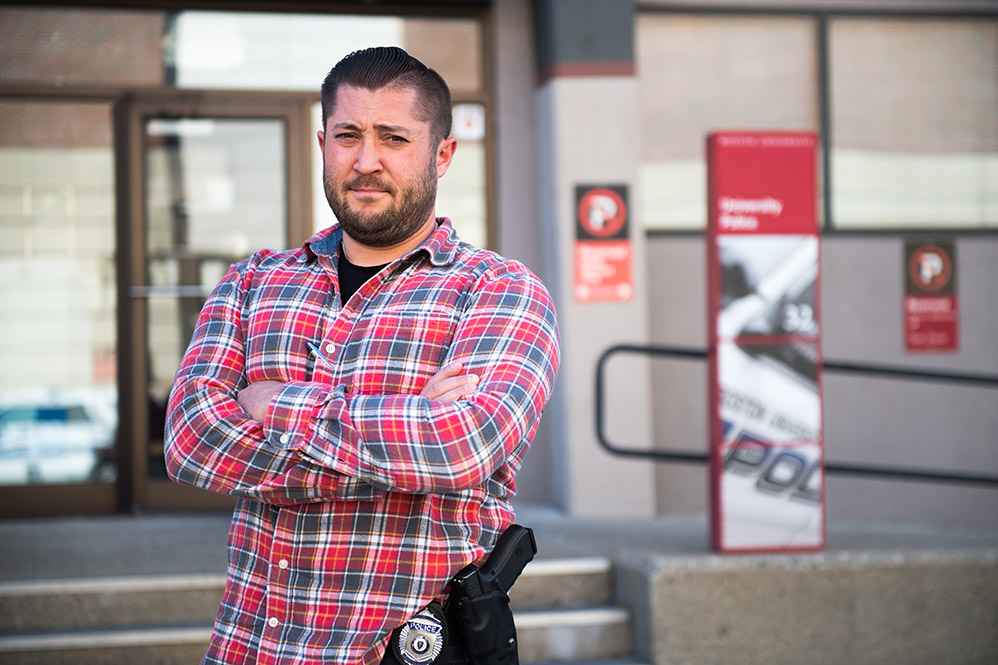The Case of the Stolen Flute
BU detectives got their man, and a sterling silver instrument

Officer Brandon Stone’s dogged pursuit of the thief of a $14,000 flute led to the instrument’s return to a CFA student, says Kelly Nee, BU chief of police. “He solved this the old-fashioned way,” she says. Photo by Cydney Scott
Larceny is not an uncommon crime on any urban campus, and the laptops and cell phones that disappear are seldom recovered. But when a College of Fine Arts music major’s $14,000 sterling silver flute was stolen one afternoon in late August, Brandon Stone, a Boston University Police Department officer, decided he wasn’t going to let the story end there.
Last week, after two months of determined, if sometimes tedious, investigation, Stone recovered the flute, and a suspect was summonsed to Brighton District Court to face felony charges of larceny over $250 and misdemeanor charges of trespassing. Friday afternoon, after talking to the insurance company, Stone returned the flute and an iPad that had also been stolen to the very happy student.
“I can’t say enough about the dogged gumshoe police work involved in doing this,” says Kelly Nee, BUPD chief. “He solved this the old-fashioned way.”
The student, who declined to be interviewed, had been practicing her music in an empty classroom at CFA, and stepped away for just a few minutes between 1:30 and 2 p.m. When she returned, the flute and iPad were gone. She immediately called BUPD.
The flute was a sterling silver model handmade a few years ago by master flute maker Juan Arista at the Arista Workshop in Bedford, Mass. Its serial number was just three digits. “Obviously this is worth a lot more than $14,000 to her,” Nee says.
Officers Michael Vanaria and Diane Smith found the first clue in the case in a security video, which showed a man hastily leaving the building via a rear handicapped exit at about the time of the theft. Stone, who attended the Boston Police Department’s detective formation training last spring and is temporarily assigned to the BUPD detective unit, took charge of the investigation and collected additional video from a nearby business, Boston traffic cameras, and the MBTA.
“Those were essential in being able to track his movements,” says Stone, noting that investigators ended up with hours of video of the suspect, but none with a flute showing.
Playing the odds, Stone combed databases of items consigned to New England pawn shops. Problem: Arista is also the name of a video game company and a movie production company, among other things. “Every night at 10 o’clock I got an email because I flagged the name Arista,” he says with a rueful smile. “They pawn a lot of video games in Maine, I guess.” But no Arista flutes.
Stone also spoke to area scrap metal companies, on the chance that the thief might have sold the flute for its silver content. He was told that they wouldn’t touch such a valuable item, especially from a dubious source. “It started getting frustrating,” he says.
Eventually, Stone found someone in the neighborhood of BU who’d had an earlier encounter with the suspect and gave Stone a name—but it was just a first name. That was enough to reduce that pawnshop database to about 500 hits. After searching hundreds of records in more detail, Stone found a 2014 transaction with a picture matching the suspect on the video.
“Thankfully, there’s a pawn shop in Boston that follows the rules,” by keeping snapshots of each client, Stone says. Now he had a last name and an address—enough information to reveal that the suspect had a criminal record that included similar opportunistic crimes.
“For some people, this is their life job,” says Stone. “And he’s rather good at it.”
Last Wednesday, Stone and Lieutenant Robert Manning went to the suspect’s residence with a search warrant, only to find out that he had moved just outside the city limits. They tracked him down and interviewed him, leaving empty-handed but feeling nearly certain that he still had the flute.
“It was strange talking to him in person after seeing him all that time on video,” Stone says, shaking his head.
On Thursday, as they were working on getting a search warrant for the new address, the suspect called and agreed to hand over the flute, along with the iPad. In return, he was summonsed to court rather than arrested on the spot, and the officers agreed to tell the district attorney’s office that he had cooperated. A court date is pending. Since the subject has not yet been formally charged, BUPD declined to identify him.
Later that day Stone called the student who owned the flute with the good news. Her reaction? “Not a lot of words. She was very shocked. She said, ‘What?’ a lot, and ‘Are you serious?’ This was her very special item, she had never replaced it, and it’s nice to get it back to her. She was pretty surprised, and so was I. It feels very good.”
Stone shares credit with all of the other officers and agencies involved, but Nee points right back at him.
“He was like a dog with a bone,” says Nee. “I couldn’t be prouder.”
Comments & Discussion
Boston University moderates comments to facilitate an informed, substantive, civil conversation. Abusive, profane, self-promotional, misleading, incoherent or off-topic comments will be rejected. Moderators are staffed during regular business hours (EST) and can only accept comments written in English. Statistics or facts must include a citation or a link to the citation.